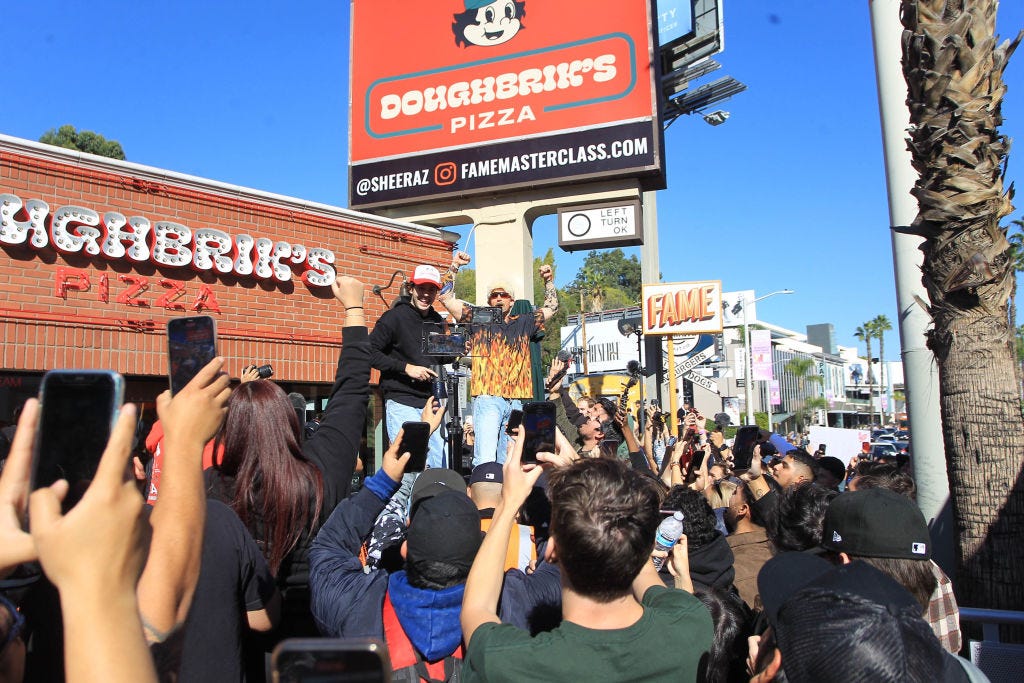Internet culture seeps into restaurants
…and it’s not just the good stuff.
Hi! This post has gotten some good attention, so I’m dropping the paywall. For more coverage on the future of restaurants:
In mid-November, a YouTuber named David Dobrik opened a pizza restaurant called Doughbrik’s on Sunset Boulevard in Los Angeles. The opening attracted a serious crowd; news reports said fans started lining up a full day before the restaurant’s debut. Reports also mentioned that fans weren’t necessarily there for the food — instead, they simply wanted a glimpse at the online star. The pizza — Chicago-style, a nod to Dobrik’s childhood home — was an afterthought.
A crowd that size was a feat in itself; Dobrik had largely stepped back from YouTube amid a string of controversies and accusations that have cost him brand partnerships, money, and a job at a company he founded. (Vulture published a running timeline of these controversies and accusations; it was updated over the summer.) Dobrik also *checks notes* married his best friend’s mom in a stunt-y Las Vegas ceremony; the marriage lasted a month before he filed for divorce in LA.
This sort of brash behavior that goes big on the internet isn’t for me. But a look at the current state of the internet shows… it is for a lot of people, including Dobrik’s 27 million subscribers across three YouTube channels. And plenty seem willing to buy what he’s selling — in this case, a pizza with his name attached.
We’ve seen this level of fandom before translate to restaurants before. A brick-and-mortar opening of MrBeast Burger, a two-year-old famed virtual concept backed by popular YouTube creator MrBeast, drew a crowd of 10,000 to the new-ish American Dream mall in northern New Jersey. This success, fueled by an online celeb with 113 million subscribers on his main channel who might be worth $1.5 billion, has set a high standard for fellow influencers intent on capturing some of that online-to-offline magic.
In that sense, the playbook for restaurant success via internet fame is established. But it’s troubling is that in some cases — like Doughbrik’s — the sort of controversy and bad behavior that tanks some brand partnerships isn’t enough to keep this specific type of Very Online Polarizing Personality (VOPPs, for my purposes) from hitching their star to a restaurant brand. The controversy fuels the proverbial online fire, and, in this case, the literal fire inside a restaurant kitchen.
This might not be the restaurant future we want, but it’s probably the one we deserve. In April, the New York Times welcomed us to “the era of the celebrity happy meal” in a piece that ran in the paper’s Style section but talked through real world business implications for restaurants collaborating with celebrities for limited-edition marketing plays.
Still, it’s hard not to feel like some of the worst parts of internet culture are seeping into the restaurant business.
About a year ago, Virtual Dining Concepts, the company behind MrBeast Burger’s mega-success, launched Barstool Bites, a concept tied to Barstool Sports, the irreverent sports commentary publication founded by controversial VOPP Dave Portnoy. Shortly after Barstool Bites launched, Insider ran two articles about Portnoy, alleging abuse from several women. Portnoy denied the allegations and sued for defamation; Insider’s editor-in-chief, Nicholas Carlson, penned a defense of the pieces and the journalists who wrote them. Earlier this month, a judge in Boston dismissed Portnoy’s lawsuit. Through it all, I was curious what might happen, if anything, to Barstool Bites.
Virtual brands — the kind that live almost exclusively online — are an especially friendly option for celeb-restaurant partnerships since they can spin up quickly and disappear just as fast. For every restaurant concept tied to controversy, there are handfuls more that operate successfully. (Anecdotally, I’ve asked leaders of companies that partner with celebrities what would happen if one of their partners was credibly accused of bad behavior, and as I recall, everyone answered that they’d reevaluate the relationship.)
At some point between mid-April and mid-May of this year (per data captured by the Internet Archive), Virtual Dining Concepts ditched the Barstool Bites website, instead redirecting visitors to a new site and new, but associated, brand: Pardon My Cheesesteak. The new concept was created in partnership with the personalities behind Pardon My Take, a Barstool podcast, and hawks five different sandwiches in two sizes. I have no confirmation or even an indication that this change is related to Insider’s coverage or Portnoy’s alleged behavior; companies sunset restaurant brands for plenty of reasons all the time.
The restaurants keep launching, some nearly as polarizing as the big names behind them. It’s only been a couple weeks for Doughbrik’s in LA, and already Yelp has had to disable reviews and placed an alert on the restaurant’s listing because of “unusual activity.” Of nine reviews on the site, seven give a one-star rating, two give five stars.
Of course, that’s just the latest online rebuke for a one-time internet star. In its article listing David Dobrik-adjacent controversies, Vulture invited judgement:
“We compiled a timeline of Dobrik’s messy past and even messier present,” the authors wrote, “so you can decide for yourself whether or not the King of YouTube is over for good.”
A long line of pizza-ready fans outside a new restaurant in LA say he’s not.




